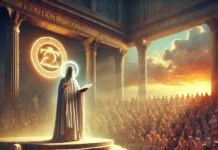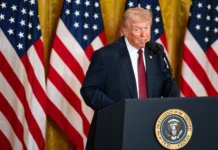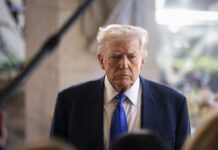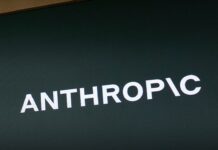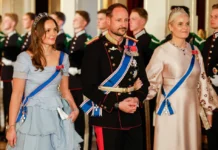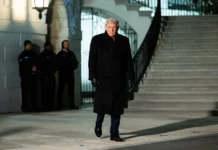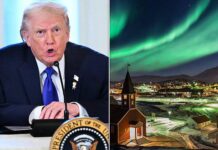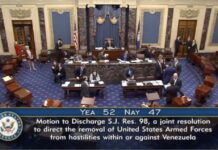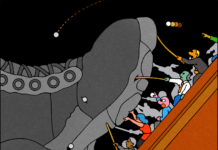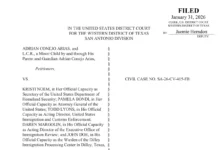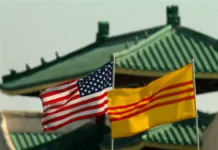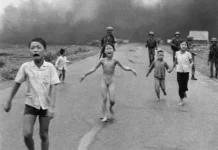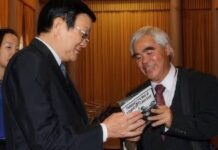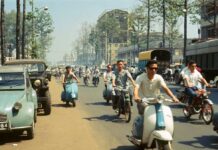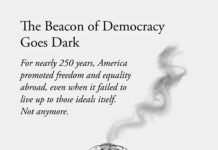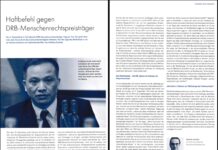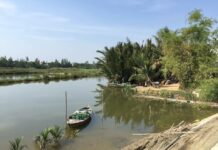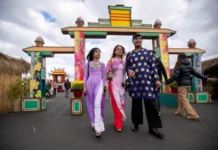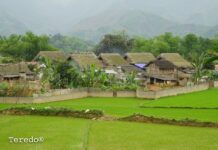Thư ngỏ của Vũ Đức Khanh gửi đồng bào và bạn bè quốc tế tham gia cuộc biểu tình phản đối sự hiện diện của Tổng Bí thư Đảng Cộng sản, Chủ tịch nước Việt Nam, Tô Lâm, trong Hội nghị Thượng đỉnh Cộng đồng Pháp thoại, được tổ chức vào ngày 04 và 05 tháng 10 năm 2024, tại Villers-Cotterêts và Paris, Pháp Quốc.
*****
Di sản Pháp – Việt và Khát vọng Tự do, Dân chủ
Kính thưa toàn thể đồng bào, thưa các bạn quốc tế thân mến,
Quý vị hôm nay tụ hội tại Paris, một thành phố mang trong mình biểu tượng của tự do, bình đẳng và bác ái, những giá trị cốt lõi đã soi sáng không chỉ nước Pháp, mà còn nhiều dân tộc trên thế giới, trong đó có Việt Nam chúng ta. Hơn 70 năm trước, khi cuộc đấu tranh giành độc lập của Việt Nam đạt đỉnh điểm, chính tại đây, từ những giá trị của nền cộng hòa Pháp, mà một thế hệ trí thức trẻ Việt Nam đã lấy cảm hứng để nuôi dưỡng khát vọng về một quốc gia độc lập, tự do và dân chủ.
Chúng ta không thể phủ nhận rằng quá trình thuộc địa hóa đã mang đến những đau thương, nhưng cũng phải nhìn nhận một cách công bằng rằng chính trong giai đoạn đó, nhiều giá trị tư tưởng cao đẹp đã len lỏi vào lòng trí thức Việt Nam. Hồ Chí Minh, trong Tuyên ngôn Độc lập ngày 2/9/1945, đã trích dẫn từ Tuyên ngôn Nhân quyền và Dân quyền của Pháp, khẳng định những quyền căn bản của con người mà không ai có thể tước đoạt. Đây không phải là sự vay mượn ngẫu nhiên, mà là một sự lựa chọn có ý thức. Từ cuộc cách mạng Pháp, chúng ta đã học được rằng quyền tự do, quyền sống, và quyền mưu cầu hạnh phúc là những giá trị phổ quát mà bất cứ dân tộc nào cũng có quyền thụ hưởng.
Bản Hiến pháp 1946 của Việt Nam, do Hồ Chí Minh chủ trì, cũng mang đậm dấu ấn của những tư tưởng cách mạng và dân chủ từ Pháp. Quyền tự do ngôn luận, tự do báo chí, và quyền bình đẳng trước pháp luật đã được ghi nhận trong hiến pháp này như một cam kết cho một tương lai tự do và dân chủ cho đất nước Việt Nam.

Nhưng, thưa quý vị, lịch sử đã rẽ sang một hướng khác. Thay vì trở thành một quốc gia dân chủ, Việt Nam của chúng ta đã rơi vào một chế độ độc tài toàn trị, nơi những quyền tự do căn bản mà cha ông ta đã hy sinh để đấu tranh vẫn còn xa vời. Chúng ta không thể quên rằng sau gần 80 năm giành độc lập, những khát vọng về tự do, dân chủ và thịnh vượng vẫn chưa được hiện thực hóa. Quyền tự do ngôn luận, quyền tự do bầu cử, quyền con người vẫn bị giới hạn, và người dân Việt Nam vẫn sống trong sự kiểm soát nghiêm ngặt của một chế độ chuyên chế.
Hôm nay, quý vị đứng ở Paris, nơi đã từng chứng kiến những cuộc cách mạng vì tự do, để cùng nhau kêu gọi một tương lai tốt đẹp hơn cho Việt Nam. Chúng ta không chỉ đòi hỏi sự thay đổi cho hiện tại mà còn muốn xây dựng một tương lai nơi người dân Việt Nam được sống trong tự do và phẩm giá. Một tương lai mà con cháu chúng ta sẽ không còn phải sống trong sợ hãi và bị kiểm soát bởi quyền lực tuyệt đối.
Vậy, chúng ta phải làm gì để hiện thực hóa khát vọng tự do và dân chủ cho Việt Nam?
Thứ nhất, chúng ta cần một cuộc cải cách thể chế. Quyền lực phải được trả lại cho nhân dân. Quyền tự do bầu cử, quyền tham gia vào quá trình ra quyết định chính trị, phải được bảo đảm. Các cuộc bầu cử cần được minh bạch và công bằng, để người dân có thể bày tỏ ý chí của mình một cách tự do, không bị đàn áp hay ép buộc.
Thứ hai, chúng ta cần giáo dục thế hệ trẻ về những giá trị tự do, dân chủ và nhân quyền. Không chỉ học trong sách vở, mà phải học từ thực tế, từ sự tham gia xã hội, từ những phong trào đấu tranh đòi quyền sống và quyền tự do.
Thứ ba, chúng ta cần phát triển một xã hội dân sự mạnh mẽ. Xã hội dân sự là nền tảng để giám sát quyền lực, thúc đẩy sự minh bạch và đảm bảo rằng không ai, kể cả những người cầm quyền, có thể lạm dụng quyền lực một cách vô tội vạ.
Và cuối cùng, chúng ta cần hợp tác với cộng đồng quốc tế, đặc biệt là thông qua Cộng đồng Pháp thoại (La Francophonie). Đó không chỉ là cầu nối văn hóa mà còn là nền tảng để chúng ta học hỏi từ những nước đã thành công trong việc xây dựng nhà nước dân chủ. Chúng ta không cô độc trong cuộc đấu tranh này. Người Việt Nam tại khắp nơi trên thế giới và bạn bè quốc tế luôn sẵn lòng đồng hành cùng chúng ta.
Thưa quý vị,
Chúng ta ở đây hôm nay không chỉ để nhìn lại quá khứ, mà còn để hướng tới một tương lai tốt đẹp hơn. Một Việt Nam nơi người dân được sống trong tự do, dân chủ, và thịnh vượng. Chúng ta không chỉ đấu tranh cho hiện tại, mà cho thế hệ mai sau, để các con cháu chúng ta không phải tiếp tục chịu đựng những bất công và áp bức như thế hệ trước.
Tôi kêu gọi tất cả các bạn, người Việt Nam và bạn bè quốc tế, hãy cùng nhau, từ hôm nay, cất lên tiếng nói mạnh mẽ đòi hỏi cho một tương lai mà Việt Nam xứng đáng được có. Một tương lai nơi di sản văn minh Pháp-Việt sẽ không bị quên lãng, mà sẽ trở thành nền tảng cho một quốc gia tự do, dân chủ và thịnh vượng.
Xin cảm ơn tất cả quý vị.
Vũ Đức Khanh
*****
Lettre ouverte de Vũ Đức Khanh aux compatriotes et amis internationaux participant à la protestation contre la présence du secrétaire général du Parti communiste et président du Vietnam, To Lam, au Sommet de la Francophonie, tenu les 4 et 5 octobre 2024, à Villers -Cotterêts et Paris, France.
*****
L’héritage franco-vietnamien et l’aspiration à la liberté et à la démocratie
Chers compatriotes, chers amis internationaux,
Aujourd’hui, vous vous rassemblez à Paris, une ville symbole de la liberté, de l’égalité et de la fraternité — des valeurs qui ont non seulement façonné la France mais aussi inspiré de nombreuses nations à travers le monde, y compris le Vietnam. Il y a plus de 70 ans, lorsque la lutte pour l’indépendance du Vietnam était à son apogée, c’est ici, à travers ces valeurs républicaines, qu’une jeune génération d’intellectuels vietnamiens a puisé l’inspiration pour nourrir le rêve d’une nation indépendante, libre et démocratique.
Nous ne pouvons pas nier que la période coloniale a apporté d’immenses souffrances, mais il est également important de reconnaître qu’à cette époque, de nombreuses idées nobles ont pénétré les cœurs des intellectuels vietnamiens. Dans sa Déclaration d’Indépendance du 2 septembre 1945, Hồ Chí Minh a cité directement la Déclaration des Droits de l’Homme et du Citoyen française, affirmant les droits inaliénables de tous : « Tous les hommes naissent libres et égaux en droits. Le Créateur leur a donné des droits inviolables ; parmi ces droits figurent la vie, la liberté et la recherche du bonheur. » Ce n’était pas un emprunt fortuit, mais un choix conscient. De la Révolution française, nous avons appris que les droits à la liberté, à la vie et à la recherche du bonheur sont des valeurs universelles auxquelles chaque nation a droit.
La Constitution de 1946 du Vietnam, rédigée sous la présidence de Hồ Chí Minh, reflète également les idéaux révolutionnaires et démocratiques hérités de la France. Les droits à la liberté d’expression, de presse et à l’égalité devant la loi y sont consacrés, démontrant un engagement envers un avenir de liberté et de démocratie pour notre pays.
Cependant, chers amis, l’histoire a pris une autre direction. Au lieu de devenir un État démocratique, le Vietnam est tombé sous un régime totalitaire où les libertés fondamentales pour lesquelles nos ancêtres se sont battus restent encore inaccessibles. Même après près de 80 ans d’indépendance, les aspirations à la liberté, à la démocratie et à la prospérité ne sont pas encore réalisées. La liberté d’expression, le droit de vote et les droits de l’homme restent limités, et le peuple vietnamien continue de vivre sous le contrôle strict d’un régime autoritaire.
Aujourd’hui, nous nous tenons ici à Paris, une ville qui a été témoin de révolutions pour la liberté, pour appeler à un avenir meilleur pour le Vietnam. Nous ne demandons pas seulement un changement pour le présent, mais nous cherchons à construire un avenir où le peuple vietnamien pourra vivre dans la liberté et la dignité. Un avenir où nos enfants n’auront plus à vivre dans la peur ni sous la domination d’un pouvoir absolu.
Alors, comment pouvons-nous réaliser les rêves de liberté et de démocratie pour le Vietnam ?
Premièrement, nous avons besoin de réformes institutionnelles. Le pouvoir doit être rendu au peuple. Le droit à des élections libres et à la participation aux décisions politiques doit être garanti. Les élections doivent être transparentes et équitables, pour que le peuple puisse exprimer librement sa volonté, sans répression ni coercition.
Deuxièmement, nous devons éduquer la jeune génération aux valeurs de liberté, de démocratie et des droits de l’homme. Cette éducation ne doit pas seulement être théorique, mais aussi pratique, à travers la participation à la société et aux mouvements qui luttent pour le droit à vivre en liberté.
Troisièmement, nous devons construire une société civile forte. La société civile est la base pour surveiller le pouvoir, promouvoir la transparence et garantir que personne, même les détenteurs du pouvoir, ne puisse en abuser impunément.
Enfin, nous avons besoin de coopération internationale, notamment à travers La Francophonie. Ce n’est pas seulement un pont culturel, mais une plateforme pour apprendre des pays qui ont réussi à bâtir des États démocratiques. Nous ne sommes pas seuls dans cette lutte. Les Vietnamiens du monde entier et nos amis internationaux sont prêts à marcher sur cette voie avec nous.
Chers amis,
Nous sommes ici aujourd’hui non seulement pour regarder en arrière, mais pour nous tourner vers un avenir meilleur — un Vietnam où les gens vivent dans la liberté, la démocratie et la prospérité. Nous luttons non seulement pour le présent, mais aussi pour les générations futures, afin que nos enfants ne subissent plus les injustices et les oppressions que les générations précédentes ont endurées.
J’appelle tous, Vietnamiens et amis internationaux, à vous joindre à nous, dès aujourd’hui, pour élever haut et fort vos voix, en exigeant l’avenir que le Vietnam mérite — un avenir où l’héritage franco-vietnamien ne sera pas oublié, mais au contraire, servira de fondement à une nation libre, démocratique et prospère.
Je vous remercie.
*****
Open letter from Vũ Đức Khanh to fellow countrymen and international friends participating in the protest against the presence of the General Secretary of the Communist Party and President of Vietnam, To Lam, at the Francophonie Summit, held on October 4 and 5, 2024, in Villers -Cotterêts and Paris, France.
*****
The French-Vietnamese Legacy and the Aspiration for Freedom and Democracy
Dear compatriots,
Dear international friends,
Today, you gather in Paris, a city symbolizing liberty, equality, and fraternity—values that have not only shaped France but have also inspired many nations worldwide, including Vietnam. Over 70 years ago, when Vietnam’s struggle for independence was at its peak, it was here, through these Republican values, that a young generation of Vietnamese intellectuals found the inspiration to nurture the dream of an independent, free, and democratic nation.
We cannot deny that the colonial period brought immense suffering, but it is also important to recognize that during this time, many noble ideas entered the hearts of the Vietnamese intelligentsia. In his Declaration of Independence on September 2, 1945, Hồ Chí Minh quoted directly from the French Declaration of the Rights of Man and Citizen, affirming the inalienable rights of all people: “All men are born free and equal in rights. The Creator has given them certain inviolable rights, among these are the right to life, liberty, and the pursuit of happiness.” This was not a random borrowing but a conscious choice. From the French Revolution, we learned that the rights to freedom, life, and the pursuit of happiness are universal values that every nation deserves.
The 1946 Constitution of Vietnam, drafted under Hồ Chí Minh, also reflected the revolutionary and democratic ideals inherited from France. The rights to freedom of speech, press, and equality before the law were enshrined in this Constitution, demonstrating a commitment to a future of liberty and democracy for our country.
However, dear friends, history took a different path. Instead of becoming a democratic state, Vietnam fell under a totalitarian regime where the basic freedoms our ancestors fought for remain elusive. Even after nearly 80 years of independence, the aspirations for freedom, democracy, and prosperity have yet to be realized. Freedom of speech, the right to vote, and human rights are still constrained, and the Vietnamese people continue to live under the tight control of an authoritarian regime.
Today, we stand here in Paris, a city that has witnessed revolutions for freedom, to call for a better future for Vietnam. We are not only demanding change for the present but also seeking to build a future where the Vietnamese people can live in freedom and dignity—a future where our children will no longer have to live in fear or under the grip of absolute power.
So, how do we realize the dreams of freedom and democracy for Vietnam?
First, we need institutional reform. Power must be returned to the people. The right to free elections and participation in political decision-making must be guaranteed. Elections must be transparent and fair so that people can express their will freely, without repression or coercion.
Second, we must educate the younger generation about the values of freedom, democracy, and human rights. This education must not only be theoretical but practical, through participation in society and movements that fight for the right to live in freedom.
Third, we must build a strong civil society. Civil society is the foundation to monitor power, promote transparency, and ensure that no one, not even those in power, can abuse it with impunity.
And finally, we need international cooperation, particularly through La Francophonie. It is not just a cultural bridge but a platform for us to learn from nations that have successfully built democratic states. We are not alone in this struggle. Vietnamese around the world and our international friends stand ready to walk this path with us.
Dear friends,
We are here today not just to look back at the past but to look forward to a better future—a Vietnam where people live in freedom, democracy, and prosperity. We are fighting not only for the present but for future generations so that our children will not continue to endure the injustices and oppression that previous generations have faced.
I urge all of you, Vietnamese and international friends alike, to join us, starting today, in raising your voices loud and clear, demanding the future that Vietnam deserves—a future where the French-Vietnamese legacy will not be forgotten, but instead become the foundation for a free, democratic and prosperous nation.
Thank you all.
*****


